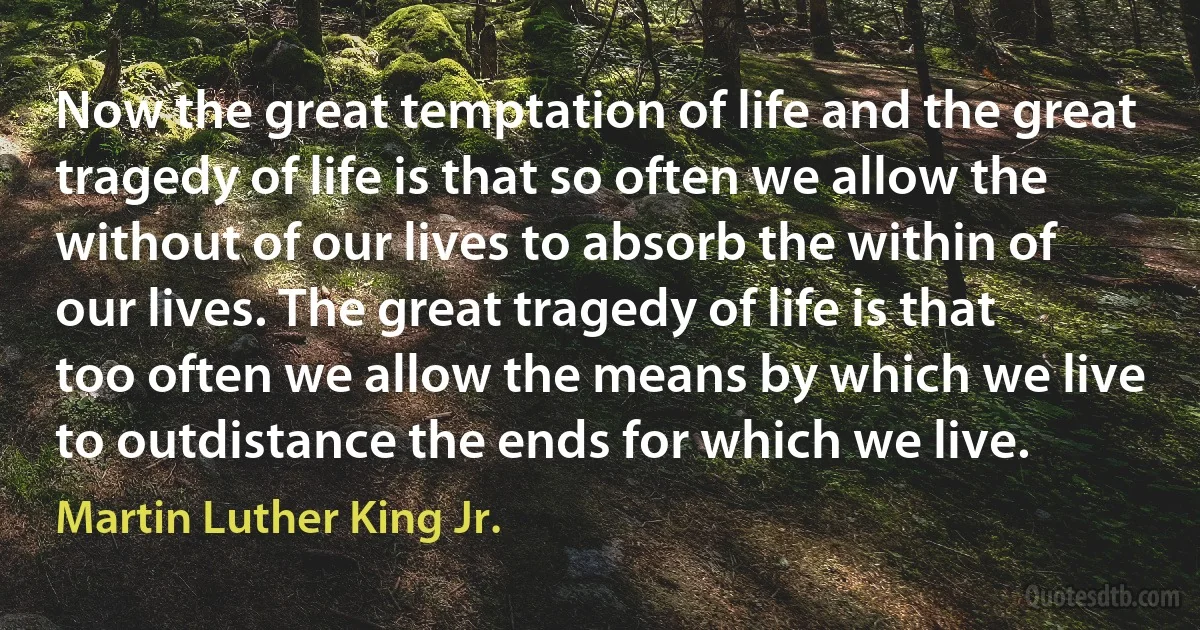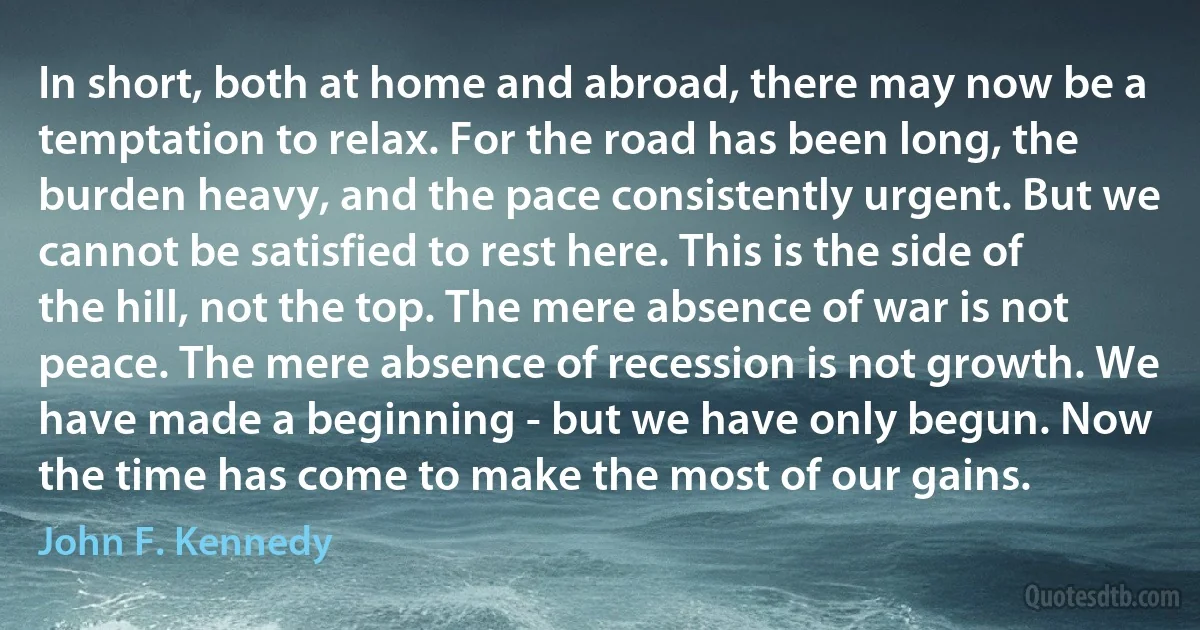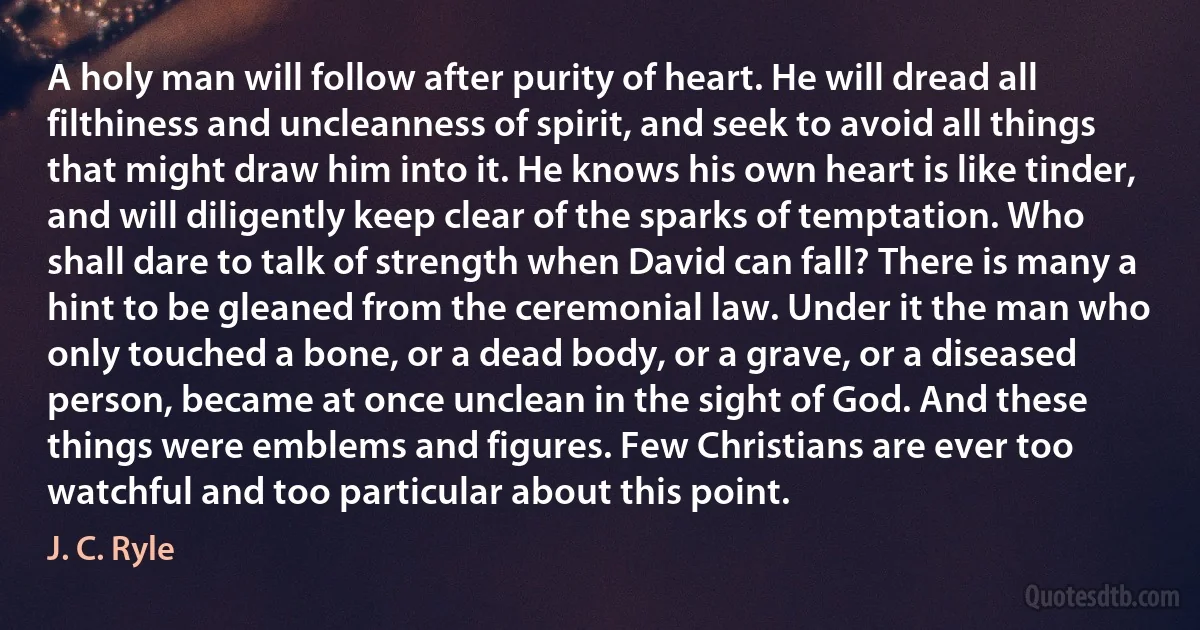Temptation Quotes - page 16
We must never become bitter nor should we succumb to the temptation of using violence in the struggle, for if this happens, unborn generations will be the recipients of a long and desolate night of bitterness and our chief legacy to the future will be an endless reign of meaningless chaos.

Martin Luther King Jr.
In every age and every generation men have dreamed of some promised land of fulfillment of freedom. Whether it was the right promised land or not, they dreamed of it. But in moving from some Egypt of slavery, whether in the intellectual, cultural or moral realm, toward some promised land, there is always the same temptation. Individuals will get bogged down in a particular mountain in a particular spot, and thereby become the victims of stagnant complacency.

Martin Luther King Jr.
I felt an unrelenting restlessness. It was the first time I had ever experienced jealousy, and that emotion clung to my skin day and night like a dark stain, a contamination I could not shed; it became so unbearable that when finally I rid myself of it, I was freed forever of the desire to possess another person or the temptation ever to belong to anyone.

Isabel Allende
Go to any elite university and you are usually speaking to very disciplined people, people who have been selected for obedience. And that makes sense. If you've resisted the temptation to tell the teacher, "You're an asshole," which maybe he or she is, and if you don't say, "That's idiotic," when you get a stupid assignment, you will gradually pass through the required filters. You will end up at a good college and eventually with a good job.

Noam Chomsky
We imagine that hardness, violence, slavery, peril in the street and in the heart, concealment, Stoicism, temptation, and deviltry of every sort, everything evil, frightful, tyrannical, raptor- and snake-like in man, serves as well for the advancement of the species "man" as their opposite.

Friedrich Nietzsche
I think if you put people in front of some huge temptation where it's possible to grab as much as they can for themselves, almost everyone will. The beauty of commerce is that it mutes that. The chap behind the counter in the corner shop has no interest in short-changing you, because he wants you to come back.

Matt Ridley
Some day, in years to come, you will be wrestling with the great temptation, or trembling under the great sorrow of your life. But the real struggle is here, now, in these quiet weeks. Now it is being decided whether, in the day of your supreme sorrow or temptation, you shall miserably fail or gloriously conquer. Character cannot be made except by a steady, long-continued process.

Phillips Brooks
The Lord sometimes allows people who are devoted to Him to fall into such dreadful vices; and this is in order to prevent them from falling into a still greater sin-pride. Your temptation will pass and you will spend the remaining days of your life in humility. Only do not forget your sin.

Seraphim of Sarov
Many flatter themselves and consider themselves to be good, humble, and meek, but they will discover the contrary under temptation. Do not not become despondent in temptations, then, but give all the more thanks to God that He thus brings you to what is hidden in your heart - the knowledge of yourself - and wishes you to be corrected and be saved.

Tikhon of Zadonsk
No one can sense his own weakness is at least a small temptation is not allowed to afflict either his body or his soul. Then, comparing his weakness to the help of God, a man comes to know its magnitude. But whoever does not know that he needs God's help, let him make many prayers. Insofar as he multiplies them, in that measure will he be humbled.

Isaac the Syrian
If... God highly exalted Christ because He humbled Himself, suffered dishonour, was tempted and endured a shameful cross and death for our sake, how will He save, glorify and raise us up if we neither choose humility, nor show love to our fellows, nor gain our souls by enduring temptation (cf. Lk. 21:19), nor follow the saving Guide through the 'strait gate' and along the 'narrow way' leading to eternal life (Mt. 7:14)? To this end we were called, says Peter, the chief Apostle, ' Because Christ also suffered for us, leaving us an example that we should follow His steps' (I Pet. 2:21).

Gregory Palamas
Feeling... clamoured wildly. "Oh, comply!" it said. "... soothe him; save him; love him; tell him you love him and will be his. Who in the world cares for you? or who will be injured by what you do?" Still indomitable was the reply: "I care for myself. The more solitary, the more friendless, the more unsustained I am, the more I will respect myself. I will keep the law given by God; sanctioned by man. I will hold to the principles received by me when I was sane, and not mad-as I am now. Laws and principles are not for the times when there is no temptation... They have a worth - so I have always believed; and if I cannot believe it now, it is because I am insane - quite insane: with my veins running fire, and my heart beating faster than I can count its throbs.

Charlotte Brontë
Until we have disarmament in Europe, no treaties will avail to prevent war. The temptation would be too great. If there is one Power with overwhelming force where its claims can be established easily and readily, the temptation will be to resort to the battlefield and not to the court of arbitration. It is therefore vital that there should be disarmament.

David Lloyd George
We should show ourselves firm in defence of collective peace. If we refuse to be scared or weakened by Germany's growing demands, if we resist the temptation to accept everything Germany asks for as a basis for discussion between us, if for a moment we can cease to be an honest broker and become the honest facer of truths, then I am confident that there is no call to view the future with alarm. If, on the other hand, we appear to the outside world to be weak and vacillating, if we allow The Times to continue to preach defeatism and to continue to be regarded as the organ of His Majesty's Government, then we shall encourage Germany's demands, and, no less serious, encourage the weaker powers to take refuge with her in the belief that the collective peace system can never be effective because England will never play her part in its support.

Anthony Eden
Our instinct has outrun our theory in this matter; for while we still insist upon free will and sin, we make allowance for individuals who have gone wrong, on the very ground of provocation, of temptation, of bad education, of infirm character. By and by philosophy will follow, and so at last we may hope for a true theory of morals. It is curious to watch, in the history of religious beliefs, the gradual elimination of this monster of moral evil. The first state of mankind is the unreflecting state. The nature is undeveloped, looking neither before nor after; it acts on the impulse of the moment, and is troubled with no weary retrospect, nor with any notions of a remote future which present conduct can affect; and knowing neither good nor evil, better or worse, it does simply what it desires, and is happy in it. It is the state analogous to the early childhood of each of us, and is represented in the common theory of Paradise - the state of innocence.

James Anthony Froude



